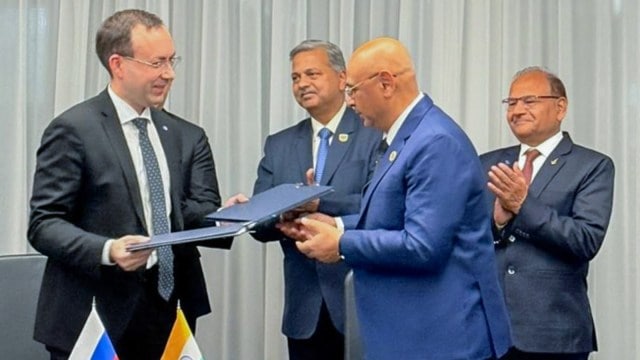At time when India’s energy and defence ties with Russia have emerged as a major irritant in the India-US relationship, government-owned Hindustan Aeronautics (HAL) has inked a memorandum of understanding with Russia’s Public Joint Stock Company United Aircraft Corporation (PJSC-UAC) — a company sanctioned by the US — to manufacture the latter’s SJ-100 regional jets in India.
If the MoU materialises, SJ-100 could become the first passenger jet to be fully manufactured in India, which harbours the ambition to become an aerospace manufacturing hub. India has been pushing global aircraft manufacturers to set up final assembly lines (FALs) for passenger jets in the country, given India’s status as the world’s third-largest domestic aviation market and the fastest-growing major aviation market globally.

The SJ-100, earlier known as the Sukhoi Superjet 100 (SSJ-100) — is a regional jet with a flight range of 3,530 km, and can carry up to 103 passengers. Other aircraft in its segment include the likes of Embraer E190 and the Airbus A220.
Story continues below this ad
While announcing the MoU, which is an initial understanding and not a firm contract, HAL — a defence ministry undertaking — did not give any timeline for the project. HAL has had a long-standing relationship with PJSC-UAC, including the partnership for manufacturing the Sukhoi Su-30MKI fighter aircraft for the Indian Air Force.
The announcement comes as Indian refiners prepare to heavily cut their Russian oil imports following imposition of US sanctions on two of Moscow’s large oil and gas companies. Notably, even PJSC-UAC is sanctioned by the US and some of its allies as part of their economic sanctions campaign against Moscow due to the Russia-Ukraine war.
The Russian aerospace and defence company was sanctioned by the US in June 2022 — in the wake of Russia’s invasion of Ukraine — as part of Washington’s action against Russia’s military-industrial complex. Others that sanctioned PJSC-UAC included the European Union, the UK, Canada, Switzerland, and Japan.
Although India has been politically opposed to unilateral sanctions, Indian companies have usually refrained from violating such sanctions, particularly when they are imposed by the US, due to the threat of secondary sanctions from Washington. Even in the case of India’s Russian oil imports, New Delhi and Indian refiners had shown no meaningful signs of buckling under American pressure, until Russian oil major’s Rosneft and Lukoil were sanctioned by Washington last week.
Despite an additional penal tariff of 25 per cent imposed by the Donald Trump administration on most Indian goods, India continued importing Russian oil in substantial volumes. It was seen as a signal to the US that India will not accept being told whom it can or cannot do business with.
Story continues below this ad
It could not be immediately ascertained if the US sanctions on the Russian aerospace company carry with them the risk of secondary sanctions. Some industry insiders said that while it is too early to ascertain the fate of this collaboration given the prevailing circumstances, there could be complications in manufacturing the aircraft in India even if secondary sanctions are not a risk factor. That is because of severe restrictions imposed by Western powers on Russia’s aerospace manufacturing sector and the consequent supply chain issues affecting Russian manufacturers’ access to Western components. Moscow’s aircraft manufacturers are developing planes with only Russian parts, but those projects are grappling with delays, as per reports from Russia.
“SJ-100 is a twin-engine, narrow-body aircraft. As on date, more than 200 aircraft have been produced and are being operated by more than 16 commercial airline operators. SJ-100 will be the game changer for short-haul connectivity under the UDAN Scheme in India. Under this arrangement, HAL will have the rights to manufacture SJ-100 aircraft for domestic customers,” HAL said.
“This will also be the first instance wherein a complete passenger aircraft will be produced in India. The last such project was HAL’s production of AVRO HS-748, which started in 1961 and ended in 1988,” the company added, without elaborating further on the partnership and project timeline.
HAL said that it is estimated that India would require around 200 jets of this category for domestic regional connectivity over the next 10 years, and another 350 planes for flights to international destinations in the Indian Ocean region.

































